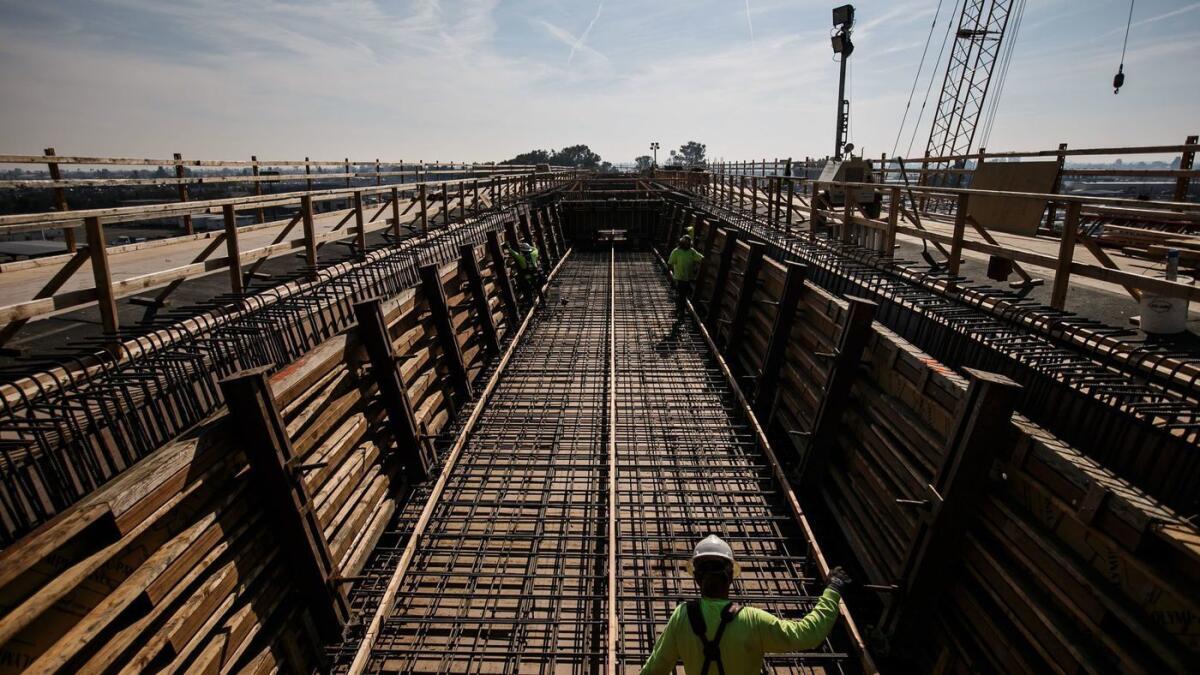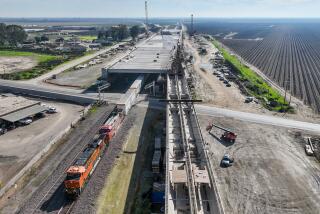Column: Democrats and Republicans in Sacramento have found something to agree on: An audit of the bullet train

- Share via
Reporting from Sacramento — Democratic legislators have heard enough. They’ve decided to take a closer look at Gov. Jerry Brown’s deeply troubled bullet train.
Brown is a lame duck headed for the door with waning Capitol influence. Neither he nor the state High-Speed Rail Authority tried to block the Legislature’s increased scrutiny. It probably wouldn’t have mattered if they had.
Democratic legislators are running for reelection or another office. And the bullet train — vastly underfunded and several years behind schedule — is good campaign fuel for Republicans.
A 14-member audit committee of both legislative houses voted unanimously Tuesday to authorize a thorough study of the project’s handling. The probe will be conducted by State Auditor Elaine Howle, a nonpartisan, highly respected veteran fiscal sleuth.
Legislators want to know whether the Los Angeles-to-San Francisco rail project still makes sense, if it ever did. How can it be better managed? When does the money run out? Then what?
Howle last audited the project in 2012. Republicans have pressed for a fresh look in recent years, but Democrats have resisted. That has largely been about politics — Democrats protecting Brown and resisting Republican attempts to score points with voters by denouncing “the bullet train boondoggle.”
Not that a lot of GOP opposition hasn’t been legitimate. People question laying the first tracks in the rural San Joaquin Valley rather than starting in populous L.A. and San Jose. And they question the seemingly endless cost overruns.
“If you ask people if they want high-speed rail, they’ll say, ‘Oh, sure,’” says Assemblyman Dante Acosta (R-Santa Clarita), a member of the audit committee. “But if you ask is it worth $65 billion to go four hours on a train at taxpayers’ expense [to San Francisco] and you can get on a Southwest flight and get there in one hour for $59, support drops to nothing.”
Voters authorized the project in 2008 after being promised costs and features that since have been abandoned. They approved $9 billion in bonds for high-speed rail and were told the federal government and private investors would pay for the rest of the $45-billion project. It was to include lines to Sacramento and San Diego. Those two regions were soon dropped.
The Los Angeles-to-San Francisco line was pegged at $33 billion. Later, that cost was nearly doubled to $64 billion, and it’s still rising.
Private investors aren’t interested. The feds have only put up $3.3 billion. The state has sold $2.8 billion of the bonds and is paying the debt with truck weight fees that really should be funding highway repairs. Roughly $600 million is being drawn annually from cap-and-trade revenue generated by selling permits to emit greenhouse gases.
President Trump could help. And if this weren’t Trump-resisting California — “out of control,” he has called us — we might have a crack at some federal dollars.
In his State of the Union address Tuesday, the president called for $1.5 trillion in infrastructure investments across the country.
“We will build gleaming new roads, bridges, highways, railways and waterways all across our land,” he declared.
OK, only $200 billion would be federal money. The rest would come from state and local governments, plus private investors. But California’s ready. We have the proposed railway, plus countless miles of roads and bridges that need federal bucks. The state has even passed an unpopular gas tax increase to fund its share of highway repairs.
But forget it as long as Republicans control Congress. Arguably the most outspoken opponent of the bullet train is House Majority Leader Kevin McCarthy of Bakersfield.
Coverage of California politics »
The tipping point for legislative Democrats in finally agreeing to an audit was the rail authority’s disclosure last month that the estimated cost of laying the first 119 miles of track between Madera and Wasco had risen from the original $6 billion to $10.6 billion.
Legislators are frustrated with the constantly rising cost projections and have lost confidence in the project’s leadership. But many Democrats still support the project.
“We are heading into the most crucial time for high-speed rail,” Republican Assemblyman Jim Patterson of Fresno told me. “This will be a make-it-or-break-it year. We’re past the happy talk.”
He added: “I’m concerned we run out of money and all we have is just this rump railroad from outside Bakersfield to outside Merced.”
Patterson and Democratic Sen. Jim Beall of San Jose teamed up to request the audit. There’s serious doubt about having enough money to even build the rail line through the Pacheco Pass and up to San Jose, let alone extending it over the Tehachapi into L.A. And that worries Beall.
Beall and Patterson are talking about a “Plan B” — a “valley to valley” line between the San Joaquin Valley and the Silicon Valley. The San Joaquin has lots of land and affordable housing. Silicon has high-paying tech jobs. Beall envisions an alliance between two top engineering schools, Fresno State and San Jose State, and huge opportunities for economic development.
“That serves folks in the Central Valley well,” Acosta says. “But since the whole state is going to pay for it, I have some concerns.”
He’d rather the bullet train money be spent on regional commuter rail with L.A. included.
All this is setting up a big decision for the next governor and Legislature: Full throttle with more money, downsize the train, or just park it? The audit should help with the answer.
Follow @LATimesSkelton on Twitter
More to Read
Get the L.A. Times Politics newsletter
Deeply reported insights into legislation, politics and policy from Sacramento, Washington and beyond. In your inbox twice per week.
You may occasionally receive promotional content from the Los Angeles Times.











